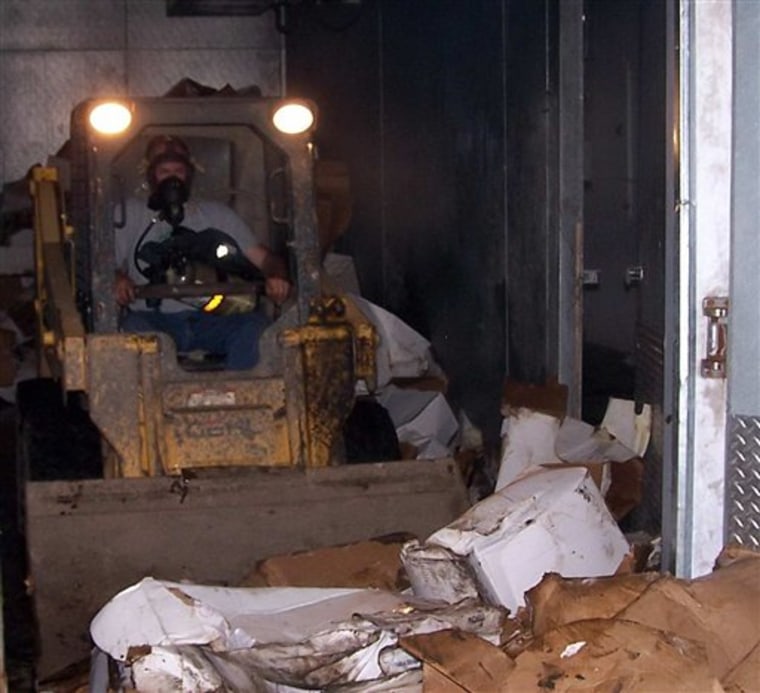Behind the freezer doors at a meat plant mysteriously abandoned by its owner, the 44 tons of bison meat managed to hold its own for months, masked by the brutal chill of two South Dakota winters.
Once the power was cut and spring thaw arrived, nature took over. And enough rotting meat to fill a high school gym did exactly what you'd expect: It stank.
It stank at the bank. It smelled at the law office. It reeked at the cafe. Even the jewelry store wasn't immune. Everyone in this tiny town could smell it, everywhere they went. A putrid odor so downright nasty the cleaners sent to mop up the gooey mess of liquefied meat — topped by a blanket of swarming white maggots and buzzed by a legion of flies — gave up after two days.
"You've also got the city offices, the grocery store and the post office. And then you spread out to the local residences," said Mayor Marty Barattini, pointing to each place. "This is a small town. We have just over 600 people, so that stench was enough to overwhelm the entire town. Not just this street."
Fed up with the smell, a brave crew of 18 city and county workers took matters into their own hands this summer and stormed the plant to haul away the putrid meat and take back their town. What came next was the biggest indignity: Three months after the cleanup, the owner still hasn't paid the $11,151 cleanup bill, and owes about $14,085 in unpaid property taxes on top of it.
"We tried to work with that guy," said a dismayed Barattini.
‘This is worse than rotten bodies’
The saga of the smell began in January 2008, when owner Ilan Parente closed Bridgewater Quality Meats and moved the business to Dawson, Minn., as Noah's Ark Processors LLC. He left the boxed kosher bison meat behind, apparently to be sold to a pet food company. It stayed frozen until the electricity was cut off in December for lack of payment.
When the town about 40 miles away from Sioux Falls began to warm in the spring, the smell began to creep out. Some said the scent was like road kill. The mayor said he spent two tours of duty in Vietnam and could not recall smelling anything as bad.
"This is worse than rotten bodies," Barattini said.
The city sent a notice to Parente to remove the caustic cause, and he dispatched two workers who toiled without protective masks, clothing, equipment or access to water or electricity. Defeated by the mess, they quit after two days.
So city and county officials got permission from the South Dakota Animal Industry Board to go inside and finish. It then became clear that the source of the smell was the meat: 88,420 pounds, according to the scale at the Sioux Falls landfill, where the mess was hauled in five dump trucks and three extra-large trash bins.
The crews and a skid loader spent two days removing the meat, which had swollen so much that the shrink-wrapped bags had burst, which caused the stacked boxes to topple. Most crew members wore an oxygen mask and hazardous materials suit because of the strong ammonia odor. Crews cleaned the building with fire hoses and doused it with bleach.
City employee and volunteer firefighter Todd Letcher wore his fire gear. "I don't think anybody should ever do something like that," he said of the job. "That was bad."
Owner: Meat wasn’t ever a health hazard
Parente's phone number is disconnected and the attorney representing him, Mike Unke, declined to comment. A woman who answered the phone at the Minnesota business said Parente is no longer affiliated with it. Requests for someone to comment went unanswered.
Parente has said before that he checked the meat in May and found it iced over due to a broken water pipe. He's claimed the meat might have stunk but says he never put anyone in danger.
"I feel bad for the people of Bridgewater who had to live with the smell. But that's really where the extent of my feeling bad goes. It wasn't ever a health hazard to anyone," he told The Daily Republic of Mitchell in July.
The county spent about $5,000 on dump trucks and men to drive them, the city submitted a bill of $3,918 to Parente for trucking costs, landfill fees, attorney fees, overtime and pest control, and the fire department's cost came in at $2,233 for wages, air tanks, two fire trucks and clothing replacement.
Thousands owned in property taxes
Parente also owes $8,628 in back property taxes and interest on the business and $5,457 on a rural house he owns, according to McCoy County records. Bridgewater City Attorney Mike Fink said that the city is in the process of discussing a settlement to recoup the cleanup costs. Months after the massive cleanup, though, the city hasn't seen a dime.
The stink wasn't the first issue with the plant. Problems with the business started several years ago when the city's sewer system began getting stopped up because of blood and other parts going down the drain at Bridgewater Quality Meats.
The state Department of Environment and Natural Resources filed a civil lawsuit against Bridgewater Quality Meats in 2003 seeking $10,000 per day of violation for dumping between October 2001 to October 2003. The last action on the case was a delay issued in March 2008. If convicted and assessed every day of that period, the penalty could top $7 million.
The fate of the building is in limbo. Parente has a "for sale" sign up in the window, but so far, there haven't been any takers. The mayor says the building could be used again, "but it would take some work." So after all the mopping, slogging, bill-paying and legal wrangling, the mayor and his citizens are left with one small, but not insignificant, benefit.
The smell is gone.
